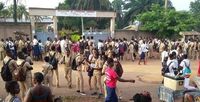On April 3, 2025, a teacher's strike in Côte d'Ivoire, initiated by various teacher unions, marked a significant moment in the ongoing discourse about educational reform in the country. The strike was intended to last for 48 hours, and while it saw varying levels of participation across different educational levels, it has sparked considerable debate about the state of the educational system.
Bli Blé David, a representative from the IS MENA/METFPA, reported that the strike had a remarkable execution rate in certain sectors. By 2 PM on the first day, he claimed that 99.66% of teachers in technical secondary and vocational training adhered to the strike's call. In general secondary education, participation was reported at 95%, while in preschool and primary education, the strike was followed by 80% of teachers. This was a clear indication of the teachers' discontent regarding their working conditions and compensation.
However, the government presented a starkly different picture. Coulibaly Adama, the Inspector General of the Ministry of National Education and Literacy, stated during a national television broadcast that the strike's overall execution rate was only 21.95%. He asserted that more than 80% of teachers remained at their posts in public schools, suggesting that the strike did not resonate with all educators. Furthermore, he noted that private schools were unaffected and continued normal operations, highlighting a division in the educational landscape.
In the northern town of M'Bengué, the strike's impact was notably uneven. While primary schools like Issa 1 reported full attendance of teachers, secondary institutions faced significant disruptions. At the Fanta Kader modern girls' college, students arrived only to find that their teachers were on strike. One student, Diabaté Salimata, expressed her disappointment, stating, "We came for classes, but we were told that the teachers are on strike." This sentiment was echoed across various secondary schools, where attendance was alarmingly low.
At the M'Bengué modern high school, the situation was similarly dire. Only 4 out of 22 expected teachers were present during the first hour, and just 2 during the second hour. The school's principal, Coulibaly Ousmane, criticized the timing of the strike, labeling it as "inopportune" given the ongoing evaluation of the Ivorian education system under the PARSEC program, which runs from March 27 to April 11, 2025. This evaluation is crucial for assessing the educational framework and identifying areas that require reform.
Adding to the discourse, an Spanish teacher at the school, Dagnogo Karidjatou, voiced her concerns, stating that the guarantees provided by the ministry did not justify abandoning classes. This reflects a broader tension within the teaching community, where many educators feel torn between the need for protest and their commitment to their students.
As the strike unfolded, the police were on high alert, implementing security measures around educational institutions to prevent any escalation of tensions. The national police announced on their Facebook page that they had prepared a security framework to ensure the safety of students and staff during this turbulent time.
This strike is not an isolated incident but part of a larger pattern of unrest among educators in Côte d'Ivoire. Teachers have long expressed dissatisfaction with their working conditions, pay, and the overall state of the education system. The unions' call for a strike indicates a growing frustration that could lead to more significant actions if their demands are not met.
In light of these developments, it remains to be seen how the government will respond to the educators' grievances. The contrasting reports of strike participation highlight a divide between the government’s narrative and the reality experienced by many teachers on the ground. As discussions continue, the future of education in Côte d'Ivoire hangs in the balance, with the potential for further protests if meaningful dialogue does not occur.
Ultimately, the situation underscores the critical need for a comprehensive approach to educational reform in Côte d'Ivoire. Teachers, students, and parents alike are looking for solutions that prioritize the quality of education and the well-being of those who deliver it. As the strike progresses, the eyes of the nation will be on both the educators and the government, hoping for a resolution that addresses the root causes of this unrest.


